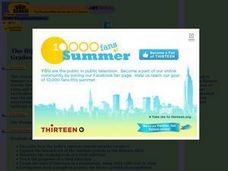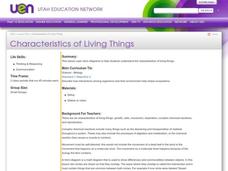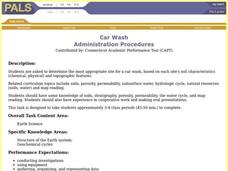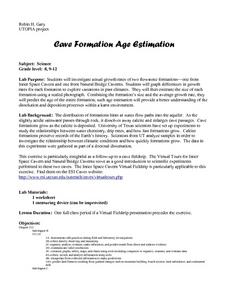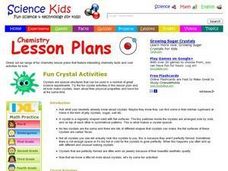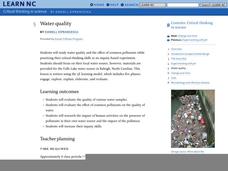Curated OER
DNA: What Does It Mean?
Tenth graders explore DNA using online tutorial. They perform their own DNA extraction from a clove of garlic and identify the key components of DNA.
Curated OER
Go Jump In The Lake!
Learners experiment with local lake water to determine the health of the lake waters. They explore the human impact on the lake water, hypothesize and share inferences in a scientific report.
Curated OER
The Hijacker - How a Virus Spreads
Students view a video that presents how viruses attack the body and how the body's immune system responds. They simulate the spread of an infectious disease and establish the identity of the original carrier.
Curated OER
Keeping Milk Fresh
Students identify the risks of spoilage and pathogens in fresh milk. They investigate the farmer's role in keeping milk safe to drink and identify safety procedures used in dairy farming.
Curated OER
Characteristics of Living Things
Students examine the characteristics of living things. They list the differences between living and non-living things, explore areas around the school, and create a Venn diagram for items found in the school areas.
Curated OER
Investigating Convection Currents
Students examine how differences in the temperature and salinity of the water help create ocean currents. They perform an experiment which shows how temperature affects the circulation of ocean water.
Curated OER
How to identify a physical change from a chemical change
Learners identify the difference between some physical and chemical properties and compare some physical and chemical changes. They design an experiment to distinguish between a physical or a chemical property of their choice.
Curated OER
Car Wash
Learners determine the most appropriate site for a car wash, based on each site's soil characteristics (chemical, physical) and topographic features. They perform an experiment to determine the changes to three different soil types when...
Curated OER
Biocomplexity Lab Activity: Creating Salt Water
The lesson seeks to intorduce to students the properties of salt water and how to create salt water. Teacher gives backgound information about salt water to students. From that point, students dscuss what elements are in salt water....
Curated OER
Biocomplexity Lab Activity: Density and Buoyancy of
Students investigate how the density of water changes the buoyancy of
water. Students create a hypothesis about what will happen when placing the
egg into the water.Students can research online different bodies of water (The Red Sea, The...
Curated OER
Cave Formation Age Estimation
Learners investigate growth rates of flowstone formations. They view a virtual field trip and discuss how flowstones form. They observe the cave fieldtrip and predict the growth rate for a cave formation. They graph growth rates and...
Curated OER
What is in Soil?
Fourth graders identify and examine the components that make up soil. Individually, they use a magnifying glass to identify the organic and inorganic material in their soil sample. To end the lesson, they record the differences in the...
Curated OER
Milestones in the Space Program
Middle schoolers brainstorm names of astronauts from NASA space missions. They are explained that the Cold War was not actually a war but pervasive tension that existed between the United States and the Soviet Union for several decades...
Curated OER
Explorit's Tree Quiz
In this online interactive tree quiz worksheet, students respond to 6 questions. Students may check their answers for accuracy.
Curated OER
Explorit's Fishy Quiz
In this online interactive fish quiz worksheet, students respond to 6 questions about fish. Students may check their answers for accuracy.
Curated OER
Collect Your Own DNA
Young scholars examine DNA and its location throughout the body. In this DNA instructional activity students collect and observe their own DNA and see that DNA can be extracted from any cell in the body.
Curated OER
Freshwater Macroinvertebrates
Students identify and count Macroinvertebrates at a Hydrology website. For this macroinvertebrates lesson students collect, sort and identify Macroinvertebrates.
Curated OER
Fun Crystal Activities
Students complete a variety of activities to learn about crystals. In this crystals lesson plan, students paint with a crystal solution, pan for crystals, grow crystals, and more.
Curated OER
Water Quality
Students analyze water quality and turbidity of collected samples. In this physics lesson plan, students conduct tests to identify the suspended particles in the samples. They explain how human activities affect water quality.
Curated OER
Creek Teach
Students develop lessons which they teach to younger students in a type of outdoor education camp.
Curated OER
The Effects of Water Quality on the Growth Rate of Freshwater Mussels
Students participate in a field and laboratory study to determine if local freshwater mussels are environmentally stressed.
Curated OER
Gelatin Volcanoes
Young scholars enjoy a hands on activity to understand how and why magma moves inside volcanoes.
Curated OER
Looking At Acid's Effects On Metals
Students perform an experiment that demonstrates acid rain. The chemical effect of acids on metals may take at least five days for the human eye to see, even though the reaction starts as soon as the acid contacts the metal.
Curated OER
To Smell or Not to Smell, That is the Ester
Students explain the basic concepts of polymerization. Students participate in a lab to create a crude preparation of carboxyl esterase and test its effectiveness in reducing the residual monomer in an emulsion such as paint.




